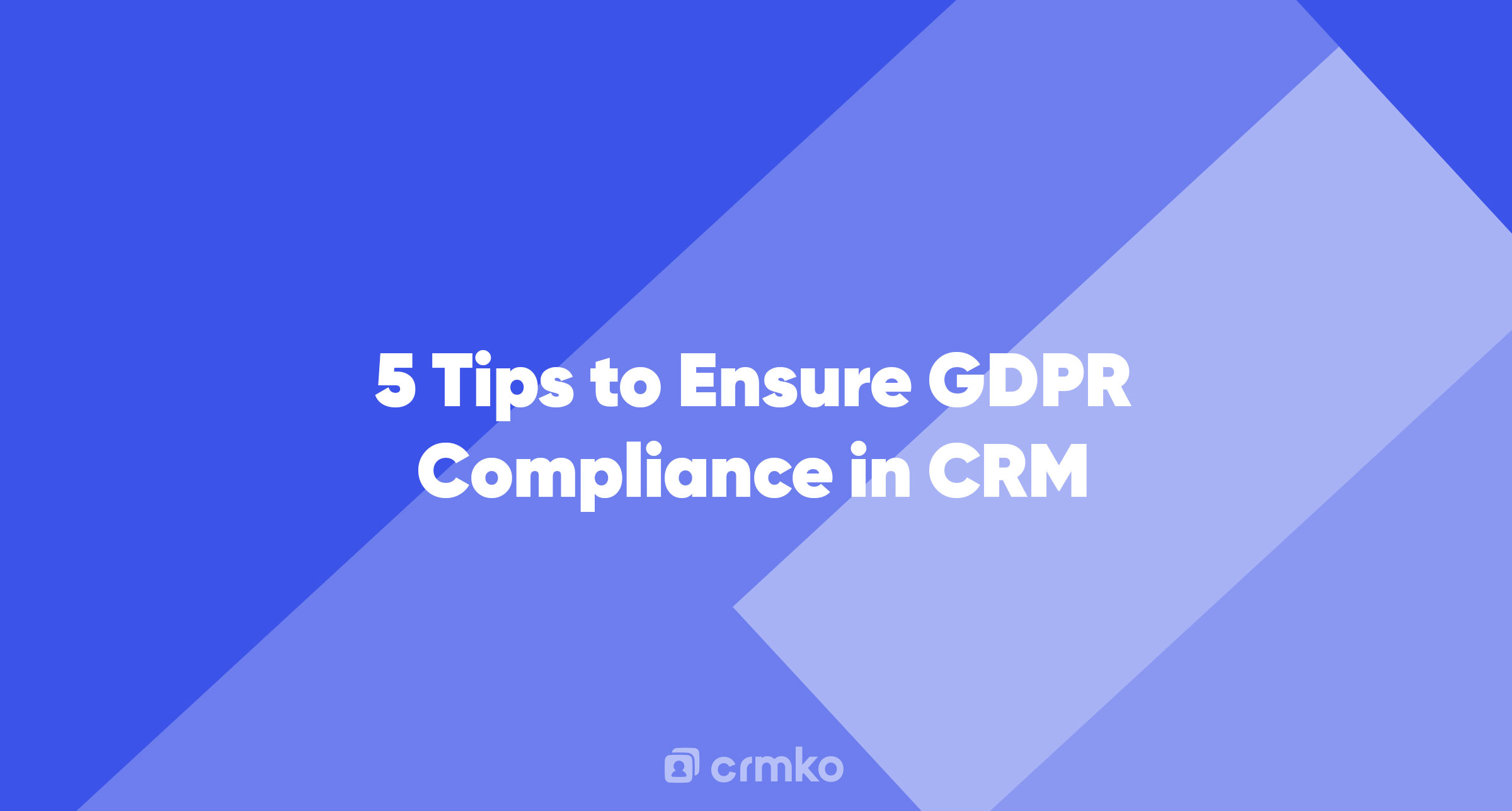In today's data-driven business world, managing customer data is a critical process. The introduction of the General Data Protection Regulation (GDPR) has brought about a significant paradigm shift in the Customer Relationship Management (CRM) landscape. Ensuring GDPR compliance has become a necessity rather than an option. The GDPR rules are stringent, with a focus on protecting customer data, and non-compliance can lead to hefty penalties. This article provides an in-depth guide on the essential steps to ensure GDPR compliance in CRM, helping you navigate this complex regulatory terrain.
Understanding the Intersection of GDPR and CRM
CRM systems have become an indispensable tool for businesses, aiding in the efficient management of customer interactions and relationships. They offer a wealth of customer data that can drive strategic business decisions. However, the advent of GDPR has necessitated a thorough review of data management practices within CRM systems.
The GDPR, a regulation that came into effect on May 25, 2018, imposes strict rules on businesses collecting or storing personal data of EU residents. It's crucial to understand that GDPR rules apply regardless of where the company or the data processing takes place. The GDPR underscores the need for businesses to be transparent about data collection, storage, and processing. It also establishes individual rights over personal data, including the right to access, rectify, and erase personal data.
Adherence to GDPR is not just about avoiding penalties; it also helps build trust with customers by demonstrating that their data is being handled responsibly. With that said, let's delve into the five essential steps to ensuring GDPR compliance in CRM.
1. Identifying and Managing Customer Data
The first step towards GDPR compliance in CRM involves identifying and managing the types of personal data your business collects. This can range from basic contact information like name and email address to more sensitive data such as bank account details. Once identified, categorizing this data becomes critical, especially since GDPR introduces a new category known as 'sensitive personal data.'
Sensitive personal data include details related to racial or ethnic origin, political opinions, religious beliefs, genetic data, and biometric data, among others. Businesses must exercise extra care when handling such data. Children's data also require special attention under GDPR rules.
Management of customer data should adhere to GDPR principles, which include lawfulness, fairness, transparency, purpose limitation, data minimization, accuracy, storage limitation, integrity, and confidentiality. By identifying and categorizing personal data, businesses can better manage and secure this information, thereby complying with GDPR requirements.
2. Ensuring Consent Management
Consent is a cornerstone of GDPR. The regulation mandates that businesses must have explicit consent from individuals to collect, process, and store their personal data. This is where consent management becomes crucial.
Your CRM system should be equipped with consent management provisions. When consent is obtained from customers, it should be documented within the CRM system. This record of consent is invaluable as it serves as proof of consent, which may be necessary during audits or investigations.
In cases where third-party services like marketing or analytics cookies collect customer data, it's crucial to ensure these services are also GDPR compliant. Additionally, businesses should provide customers with an option to opt-out of these services if they wish.
3. Implementing Data Protection Measures
The protection of customer data is of paramount importance under GDPR. Businesses should adopt robust security measures to safeguard customer data stored in their CRM systems.
These measures can range from limiting access to customer data within the organization to implementing data encryption and other security tools. More sensitive data may require additional layers of protection. Regular system updates and risk assessments are also essential to maintaining data security.
In the event of a data breach, GDPR stipulates that businesses must notify the affected customers and the relevant authority without delay. This underscores the need for businesses to have a comprehensive data breach response plan in place.
4. Upholding Customer Rights Over Data
GDPR grants individuals several rights over their personal data. These include the right to access, rectify, erase, restrict processing, data portability, object to processing, and rights related to automated decision-making and profiling.
Your CRM system should enable customers to exercise these rights easily. For instance, if a customer requests to delete or modify their data, your CRM system should be capable of carrying out these requests promptly. It's also crucial to provide a valid reason if you need to delay or refuse a request.
5. Regularly Assessing the Customer Database
Regular assessment of the customer database is a crucial step towards GDPR compliance. This involves analyzing the stored data and the system for potential risks or vulnerabilities.
Such assessments can help identify possible threats to data security and implement appropriate measures to mitigate these risks. It's also a good practice to document these assessments as they can provide valuable insights into your data management practices and help demonstrate compliance with GDPR.
Conclusion
Ensuring GDPR compliance in CRM is a multifaceted process that requires a comprehensive understanding of the GDPR rules and a thorough review of your CRM practices. However, compliance should not be viewed solely from a regulatory perspective. GDPR compliance can also enhance customer trust by demonstrating that their data is being handled responsibly.
By following these five steps, businesses can navigate the complexities of GDPR compliance in CRM, thereby ensuring data protection, building customer trust, and avoiding potential penalties. Remember, effective data management is not just about adhering to regulations; it's about respecting customer privacy and building lasting relationships.
